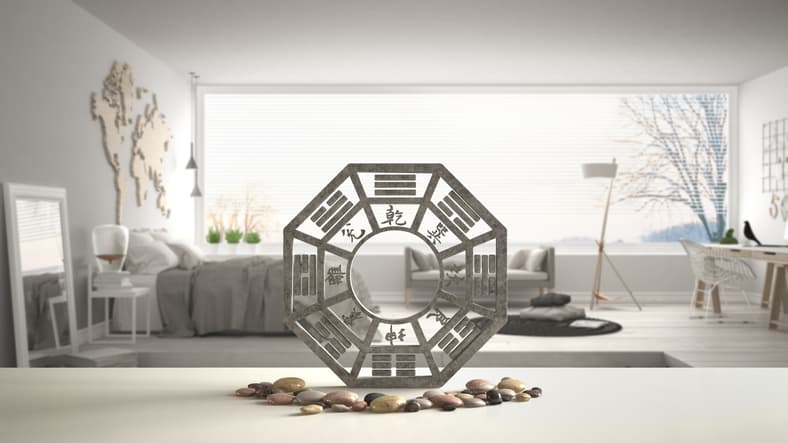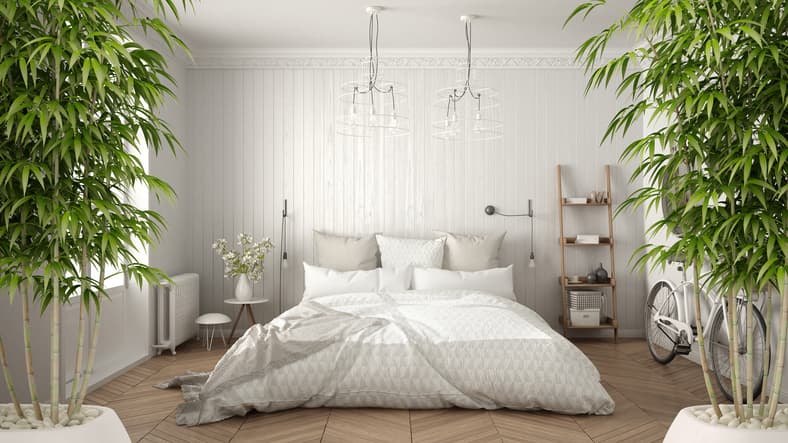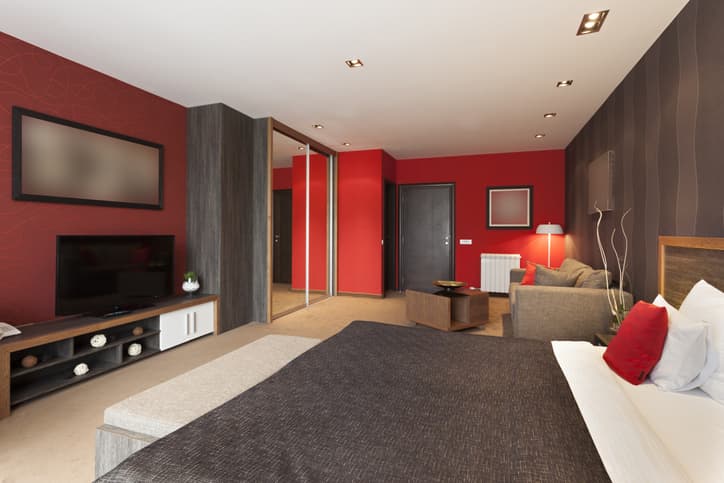
How to Feng Shui Your Bedroom
June 14, 2022
Decor
Let’s be honest — your living spaces say a lot about you. Likely, you want what they say to be positive. So, it can be a tad stressful trying to figure out how to arrange your bedroom and how to decorate it for ultimate comfort and to impress company.
You’ve probably already heard the term feng shui but may be unaware of its principles. Considering the increasing popularity of feng shui in Western culture, you may worry your guests are already judging your dresser placement. So, you may as well learn the basics.
Whether moving into a new bedroom or redoing your old room, check out some ways to achieve a good feng shui bedroom layout.
What is Feng Shui?
According to National Geographic, feng shui is a historical art form that originated in China. There is speculation that the Chinese have used the principles of feng shui for more than four thousand years. Feng shui roughly translates to “the way of wind and water,” and the idea likely stems from the Taoist belief in chi. Chi is where the yin and yang elements come from.
What Does Feng Shui Mean?
Feng shui is the idea that you can keep a room’s energy balanced. By allowing energy to flow freely, you can establish a sense of peace more easily. Creating an environment that balances out the yin and yang elements encourages a sense of harmony within oneself. Thus, creating positive chi or positive energy.
When learning how to feng shui in your home, your bedroom will be a great place to start. Considering the amount of time spent in a bedroom (yes, sleeping counts), your bedroom’s feng shui should inspire the ultimate sense of peace.
How to Feng Shui Your Bedroom
Check out the following tips on a feng shui bedroom layout.
1. Make the Bed the Focal Point of the Room
Your bed should be central in the room. However, the bed being central is worth sacrificing if this isn’t possible without the bed facing the door without being right in front of the door. Laying on the bed, you should be able to see if someone enters, but not be looking directly out when the door is open.
According to feng shui, you should also avoid placing the bed facing a mirror, allowing the bed to block any windows, or positioning the bed against a wall with plumbing right behind it (or above it if your home has multiple levels). The bed itself should have a solid frame and a sturdy headboard.
2. Be Purposeful About Your Color Scheme and Décor
According to a 2018 study by the National Institute of Health, blue was most often associated with calm people. While it would be quite dull to decorate the entire room in shades of blue, keeping the most prominent aspects of the room (paint, bedspread, rugs, curtains, etc.) as close to a soothing shade of blue as you enjoy could be beneficial to the peace you’re trying to achieve. If you dislike blue, consider colors within the blue spectrum (light green or purple, for example).
It’s also essential to add your own flair to your space when it comes to the décor. However, keep in mind how you want the room to feel. For example, if you want the room to invoke a sense of passion for the romantic aspect of a bedroom, then adding pops of red could be a good idea.
3. Try to Maintain Open Space
Clutter and unnecessary items can disrupt the flow of energy. Therefore, decluttering and maintaining free space is a key element of feng shui. Decluttering will also help you not be distracted by the stress that disorganization can bring you. This can be achieved by investing in cabinets to store items out of sight, leaving the space under the bed empty, leaving plenty of room on both sides of the bed, keeping surfaces tidy, and keeping drawers and doors closed when not in use.
4. Maintain Minimal Distractions
A bedroom should primarily be dedicated to sleep and relaxation. Thus, the room should be a place with little to no distractions. To rid yourself of distraction, consider moving bookcases to a different room, moving your desk into a separate room (or getting a closing desk so you can keep your work life separate), and don’t make a habit of keeping electronics in the room. The bottom line is that your bedroom should be a place where you feel relaxed. It should be as close to an oasis for your mind and body as is possible.
5. Create the Ideal Lighting
The key to lighting a bedroom is options. By putting the overhead light on a dimmer, having candles available for relaxation, and investing in decorative lamps, you will give yourself the relaxed lighting you need for unwinding while still having the option of vivid light when necessary. Ideal lighting for restfulness is another reason to have limited electronics in the bedroom.
Not only can electronics be distracting from the wind-down process (and your love life) but keeping electronics out of the bedroom reduces your exposure to blue light before sleeping. According to the Sleep Foundation, exposure to blue light (the light emitted from most electronic devices) can disrupt your body’s ability to make melatonin (the sleep hormone), which can cause sleep disturbances.
6. Add Natural Elements
When purchasing bedding, choose fabrics made from natural fibers so they are more breathable and comfortable. When decorating, consider adding a small decorative plant that is easy to maintain. When you can, have a window open.
Another thing you can do when the weather doesn’t permit opening the window is to get a diffuser with natural-smelling essential oils to stimulate the sensation of the outdoors.
While the rearranging and redecorating feng shui requires can be a bit of a hassle, it is worth it to experience a new sense of balance in your living spaces. Even just a few minor adjustments can make all the difference. Adjustments such as placing the bed in a more central location, adding more relaxed colors, adding a couple of natural elements, and decluttering will completely rejuvenate the energy in your bedroom.






